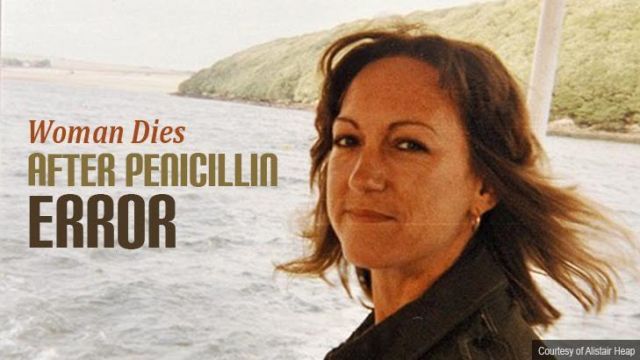
An inquest into the death of a British woman in 2014 has found that she died as a result of an allergic reaction to penicillin. The penicillin was administered to cancer patient Philippa Gillespie after she was admitted to Withybush Hospital in Wales, UK, on January 8, 2014.
Gillespie was brought to Withybush Hospital due to complications relating to terminal lung cancer. Despite the penicillin allergy listed on her notes, she was prescribed Augmentin (a penicillin antibiotic) and died three days later. Coroner Mark Layton stated that Gillespie, “died from an allergic reaction to penicillin administered in error by hospital staff.”
In a letter written to Roy Conolly, Gillespie’s partner, shown on BBC Wales, Hywel Dda University Health Board CEO Joe Teape accepted that responsibility for the error lay solely in the hands of staff who worked at the hospital and who cared for the cancer patient. “The health board admits that a qualifying liability does exist on the basis that there was a failure to adhere to health board policies and procedures by the medical and nursing staff,” Teape said. “I hope you will be assured that a complete and thorough investigation has occurred and that we have taken immediate actions to prevent a similar incident occurring in the future.”
According to Caroline Oakley, the health board’s director of nursing, this action involved repeated training for all hospital staff and the introduction of monthly medication safety audits throughout the health board’s units. The hope was that this action would “ensure that any practice which has the potential to lead to harm is improved.”
It is likely that these words of remediation have done little to mollify Conolly, who lost his partner as a result of a simple hospital mistake. “She knew 2014 would be her last year, but we didn’t expect her to go quite like that – we didn’t have time to say goodbye,” Conolly told BBC Wales reporters. “It was such a basic error,” said Conolly. “It seems almost inconceivable because the staff were told five times.”
Conolly went on to say, “She isn’t the first person to die and I fear she won’t be the last.”
Sadly, Conolly is all too correct in his assertion that his partner was not the first to die this way. In 2012, 80-year-old John Dudding suffered a deadly reaction after being given a penicillin-based injection at Derriford Hospital in Plymouth, England. He died a few days later. The circumstances were eerily similar to those that led to the death of Philippa Gillespie in 2014. Dudding’s daughter, Kim Tremaine, claimed that her father’s allergy was clearly documented on his medical chart, but it wasn’t seen because there was a Post-It note in the way.
Tremaine told reporters that her father was also wearing a red wristband to signify that he had allergies, but no one rolled up his sleeve to check. “In my opinion Derriford Hospital killed my father and did very little to save him,” she said. “My dad didn’t go in there ill enough to die. The care he received was appalling, disgraceful.” Tremaine sued Derriford Hospital for clinical negligence.
Take a step even further back in time to May 2007, and we find another case of someone being killed by an allergic reaction to penicillin due to hospital negligence. As with the cases of Gillespie and Dudding, St. Bartholomew’s Hospital in London was well informed of Jane Cutmore’s allergy to penicillin when she was admitted for double bypass surgery. Cutmore’s medical notes made her allergies very clear and, like Dudding, she was also wearing a red wristband.
This wasn’t enough to save her, however, and she died shortly after being injected with Augmentin.
Look back through the years, and we begin to see more and more of these cases popping up. Hospital negligence causing the untimely death of patients who had very clearly stated their allergies to penicillin, but had been administered the drug nonetheless. Each time, the hospital or health board made promises to improve procedures and enforce stricter control measures, but the sad fact is, these incidents will probably continue to occur in the future.
It’s time for hospital staff, doctors, and other members of the medical community to fully recognize the dangers of antibiotics and their potential to cause serious harm, if not death, when administered incorrectly. Based on these cases and many others like them, mainstream medical practitioners are far too carefree with the use of penicillin and appear to be administering it too frequently. There needs to be a dramatic shift in how penicillin is used in medicine, and it needs to happen now — before someone else dies because of it.
Allergic reactions aren’t the only reason why antibiotics are dangerous. Here are further reasons you should avoid antibiotics.
—Liivi Hess

